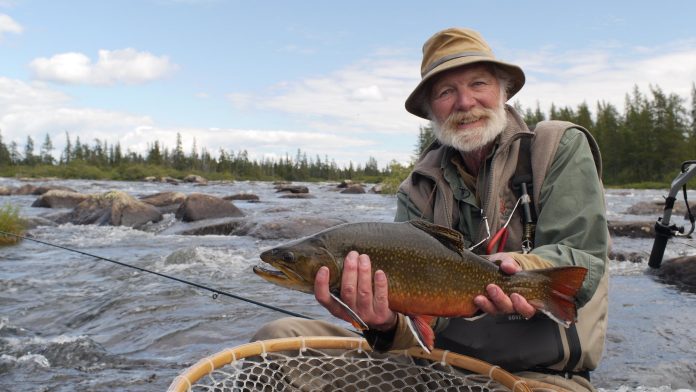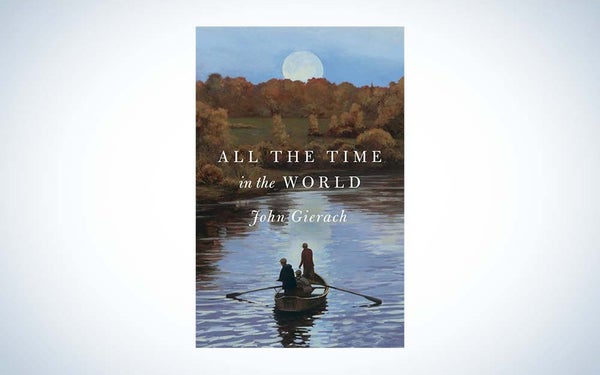Nearly 40 years after writing his first book, “Trout Bum”, John Gierach is still living in the Front Range of Colorado, chasing trout on his local streams, and writing stories about his adventures. And that’s what his most recent book, “All The Time in the World”, is about—fish, road trips, home waters, and friends.
Gierach has written over twenty books about fly fishing and countless essays for magazines like Field & Stream, Trout, and Gray’s Sporting Journal. While his books and stories differ in characters and settings, they all share his easy, enjoyable, and often funny prose. I sat down with Gierach to talk about his new book—which was released last month—and some of the short stories and characters that stuck out throughout it.
How would you describe your new book, “All The Time in the World?”
If I could describe the book in 250 words, it wouldn’t have to be 80,000 words long. But strictly speaking, it’s a collection of linked essays, more or less, about fishing. Although, Nick Lions said the best fishing stories aren’t really about fishing. There’s some of that too.
Many of your stories take place in your home state of Colorado, why did you choose to move there in your twenties?
I was done with the Midwest, and I just wanted to come out West. I didn’t really choose to move here, I just ended up out here. I drove to Colorado after college to look around, and the next thing I knew, I had a job and was up in the mountains working in a silver mine. When that fell apart, I came back to Boulder and got another job, and next thing you know, it’s 50 years later, and I’m still out here.
Were you writing when you worked in the mine, or did that come later?
I started writing in high school, actually. It was a long time before I started writing well, but unless you study writing in college, you start out struggling and running into dead ends and not knowing what you’re doing and not knowing how to publish your work.
For a book like this, with a collection of short stories, do you write them with the intention of putting them into a book? Or do you write them first and then see what fits later?
Well, that’s hard to say. I’m not always aware of writing them as part of a book, but it’s always in the back of my mind. At first, I didn’t think of it at all. I just wrote magazine essays and then compiled them into my first book of essays, and that worked out pretty well.
When I’m done writing, I’ve learned to go back and figure out the order things go in. And with this new book, that was easy because Covid hit right in the middle of things. I had part of a book that was written before Covid and part of a book that was written after, so it was pretty easy to organize. Once I know what the order should be, I’ll go back and rewrite the whole thing as a book instead of just as stories lined up in a row. I think that makes a big difference.
From the first story in your book, it sounds like you didn’t always take the time to appreciate where you were on the river. When did you start noticing your surroundings more, and do you think it helps with your writing?
I can’t put a finger on when I started, but I think it was fairly early on. I vaguely remember going on a trip somewhere and coming back and somebody asking me, “What does the river look like? What does the countryside look like?”
I had to say, “Well, all I saw was the bank going by. I never looked up.” As a writer, I realized that was stupid. Maybe I should know what it looked like, and maybe there was something up there that would be interesting enough to make it into a book.
After that, I just thought, “I need to spread out. I need to know what’s going on around me. I need to do more research. I need to take more in.” A lot of writing is about details, and a good essay builds up a good novel with just the accretion of one detail after another.
Do you take notes when you’re on the river, or do you just make mental notes of what you see and stuff to remember?
I take actual notes, but they’re pretty sketchy, and they tend just to be stuff that I don’t want to have to go back later and remind myself of, like, “What was the guide’s name? What drift boat did he have?”
In The Green Cabin story, you write about how you used to fish “ferociously,” but now you like “the idea of catching a few but otherwise leaving things the way you found them.” I’d say I’m still in the ferocious stage. Do you think it changes for everyone?
No, I don’t. I think it changes with some people. I’ve met late middle-aged guys that want to fish every daylight hour and catch as many fish as possible. So no, I don’t think that automatically happens, but I think it happens to a lot of us at some point. If there was anything we were trying to prove, we’ve already proved it.
Do you ever get burnt out or worry you’ll run out of stories to write about fly fishing?
I don’t know that I ever get burnt out on fly fishing itself. Sometimes I get a little bored with the hype of the business. I really haven’t seen anything new in fly fishing for 20 years. Everybody says they’ve got something new, but when you look at it, it’s an old thing that’s been resurrected.
In the Licenses chapter, you talk about everything being done online nowadays and how you try to find a local fly shop or bait store when buying a non-resident fishing license “to encounter the actual world and the people and things in it.” How much do these small trips to fly shops and bait stores help you find stories?
It’s just more detail. As a writer, you get nothing in terms of material when you go on a website and buy a license and print it out. But there’s always the chance when you go into a hot bait shop somewhere that you’ll see or hear something unusual. I think the online world is killing our humanity, and I try to do as little of it as possible.

One of my favorite chapters was Road Trips. In your mind, what makes a good fishing road trip?
It could be anything, but a lot of times, it’s less the destination and more the trip, which is what that story was about. I really enjoy road trips around the West. You see things, and it takes time to get somewhere. Flying is always really disorienting to me because you lose your sense of distance. That’s a nice thing about being in the car—you see it all go by.
You talk about your affinity for bamboo rods in the book. Should I get a bamboo rod? Should everyone?
No. Bamboo rods are like really good whiskeys or vinyl records. People who think they’re better and worth the money should get them. And people who don’t shouldn’t. Anyone who’s curious about a bamboo rod should get their hands on a good one and cast it and see what they think. But I don’t know that there’s anything that everybody should do.
Towards the end of the book, you write about fishing throughout the pandemic. Did you learn anything new about your home waters during Covid when you couldn’t travel to fish?
I did. Good and bad. Some places that I hadn’t been to in a long time were not the same as they had been 30 years ago. There were a lot of people on the rivers during the pandemic, and a lot of people took up fly fishing because it was a safe thing to do. There were a lot of beginners on the water, and they didn’t do a lot of harm to the fish because they didn’t catch a lot of fish. Many times, you could just wait them out.
I found a few places that I either hadn’t fished before or hadn’t fished in a long time, and I noticed some of the little secret honey holes I used to have. They were a little harder to get to this time and it seemed like they were twice as far from the truck. But I managed. I caught fish, had a good time, got out, and wrote a couple of stories.
Read Next: Q&A: Erin Block on Writing Emotionally Charged Poems About Hunting
You’ve fished in a lot of places throughout your life, but if you could fish for one species in one place, what and where would it be?
Fishing for big brook trout in Labrador. I’ve been up there maybe 14 or 15 times now over the years, and I’m going again in August. It’s pretty much untouched. It’s flat, and it’s boggy, and it’s buggy. But the brook trout are huge, and they eat flies. The people are really laid back and friendly and funny. I have friends up there now, and I’m good friends with a guy who runs Three Rivers Lodge, Robin Reeve, and I go up and fish with him every second or third year.
What’s next for you?
Hopefully, fishing the olive hatch on the Frying Pan River in early May. By July, I’ll be up in the Midwest fishing for bass. In August, I’ll be up in Labrador fishing for brook trout and so on. Rinse and repeat, right? And I don’t know what’s going to come up. Things come up suddenly, and I usually am able to jump on them. You never know when a friend will call and say, “Hey, what are you doing in two or three weeks?”









